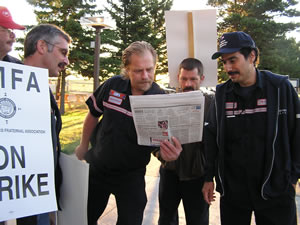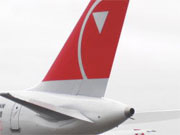August 20, 2005
 |
| Striking Northwest Airlines mechanics in Duluth read their story in a newspaper as the day dawned on Saturday. (MPR Photo/Stephanie Hemphill) |
Washington, DC — The union and the airline left the offices of the National Mediation Board, laying blame for the strike squarely on each other. The mechanics accused Northwest of failing to negotiate in good faith. The airline said it could have reached agreement with the union, had the mechanics gone along with its proposal to cut annual maintenance-related expenses by $176 million or come up with a plan of its own that would save the airline the same amount of money.
"For the last year-and-a-half, Northwest Airlines has been planning for this point in time. Throughout the course of negotiating we saw very little sincere effort by the company to come to a mutual resolution," said mechanics union negotiating committee Chairman Jim Young.
Moments after the strike began, Northwest Vice President for Labor Relations Julie Hagenshowers told reporters that the Aircraft Mechanics Fraternal Association, known as AMFA, had every opportunity to make choices, that although difficult, could have brought about a contract.
"We were very open with AMFA from the beginning of the negotiations, indicating that the savings target was $176 million. We offered some roadmaps that allowed us to achieve that savings, told them if they could find an alternative method of getting there so long as the savings were real, that would have be acceptable to us," she said.
NO FACE-TO-FACE TALKS
On the final day of talks the two sides never met face-to-face, nor did they exchange any proposals despite being holed up at the offices of the National Mediation Board for 15 hours.
Northwest says it's prepared to fly 100 percent of its schedule without its union mechanics. Shortly after news of the strike broke, Northwest's union pilots and flight attendants said they would not honor the mechanic's picket lines. So did the the International Association of Machinists which represents baggage handlers and other ground workers. The airline says it will rely on replacement workers and will outsource more aircraft maintenance.
Of Northwest's confident prediction it will be able to operate normally without its mechanics union, AMFA's Jim Young said "it's ajoke. It's not going to happen."
Northwest says with replacement workers and more outsourcing, it will be able to immediately implement savings that will allow it to reach its maintenance cost-cutting goals. When asked what it would take to bring them back to the negotiating table, Jim Young, the mechanics negotiating committee chairman replied, "a sincere effort by Northwest Airlines."
Ken Reed, president-elect of Local 35 of the mechanics union in Duluth, says Northwest wasn't bargaining in good faith, and was blaming mechanics for its own mistakes.
Darrel Becker, who was on the first picketing shift at the Minneapolis-St. Paul airport at the airport, said he's discouraged by Northwest's demands to cut the mechanics workforce by half and outsource more and more maintenance. He plans to leave the aviation industry.
"I thought 16 years ago it was a good field to come into. Northwest Airlines is a good company. But the people running this airline in the upper eschelon are just ridiculous," he said.
Mechanic Mark Yoshida, who has worked for the company 21 years, says his last hours on the job were hard since he felt unwanted.
"We realize that the economic state of the airline is horrible -- our airline, all the airlines -- and we want to save the airline. But their demands are so strong, so it's basically that they don't want us to save the airline. And they don't want us period. And as I said, before, we're not asking for a pay raise here. We're just asking for a job."
Yoshida says the company ramped up security in the last few days before the strike and took away mechanics' access badges. He says he doesn't know what he'll do for work if he loses his job.
NO DISRUPTIONS YET
At a news conference, Northwest Airlines executives said their contingency plan was working "flawlessly," with very few cancellations and flights predominantly on time.
Andy Roberts, the carrier's vice president of operations, said a union slowdown Friday inconvenienced some travelers, and he apologized. But he said replacements were clearing up a backlog of minor maintenance issues.
"We certainly don't expect delays to increase" as the strike progresses, he said. "As we work through these maintenance writeups, the operation should continue to improve."
But passengers in the know weren't taking chances.
Todd Olson, of Lino Lakes, showed up at Minneapolis-St. Paul International Airport with his family "extra, extra early" for a 9 a.m. flight to Disney World in Orlando, Fla.
"So far it seems like it's going smoothly," Olson said. "We're more worried about our flight home next week."
Some Northwest passengers said they were uneasy Friday night.
"I'm a business traveler. I'm from Detroit, this is my home. I don't have a lot of options," sales executive Jason Wells said after landing at Detroit Metropolitan Airport, one of Northwest's hubs. "Let's just get 'em to agree on something, that's all."
DAMAGE CLAIMS
Northwest's pilots said the airline appeared to be running smoothly, said Hal Myers, spokesman for the Air Line Pilots Association. The union is running an around-the-clock call-in center to answer pilot concerns about maintenance issues.
He said there were reports from Detroit on Friday that some of the tractors used to push airplanes back from the gate had damage to their ignitions, and that keys were broken off in the locks of some jetways. But "we didn't see anything done to aircraft that would pose a safety threat," he said.
THE "GREETERS" AND THE MEN IN DARK GLASSES
At the Minneapolis-St. Paul airport, there were new characters who were hard to miss this morning out at the airport. Just inside each door to the ticketing area, strategically placed Northwest management employees were ready to respond to any travelers concerned about the strike. One of them described herself as a "greeter."
Just outside the doors, sullen, strong-looking men with dark glasses patrolled the sidewalk or stood against the baggage carts with arms crossed. They were mute in response to questions, and turned their backs when their picture was taken. These security officers are likely there to watch the mechanics picketing and leafleting outside the terminal. Mechanics say they are hired by the airline for intimidation, and possibly to goad the striking workers into a confrontation. Northwest has declined any comment about the security forces it has hired.
THE REPLACEMENTS
Northwest trained its replacement workers in Arizona this summer. Last week, Northwest executives laid out details of its plan to fly without the union mechanics. The company also pointed out that 37 percent of its maintenance is already done by outside vendors.
However, in an Aug. 9 regulatory filing, the airline acknowledged that it can't be sure its replacement workers would allow it to fly a full schedule.
"Any labor action that results in a significant operational disruption, even for a short period of time, could have a severe detrimental impact on the Company's financial condition," it wrote, and that would "substantially increase the risk" that it would need to file for bankruptcy protection.
The Federal Aviation Administration has said it would increase inspections of Northwest operations. Mechanics have questioned its ability to do that, saying FAA inspectors are already stretched too thin.
In a hotline message to employees Saturday morning, Northwest CEO Doug Steenland said the FAA has monitored the negotiating process closely and "has stated that we are compliant with their stringent regulations."
He also said Northwest would spend $3 billion on fuel this year - 66 percent more than last year - if fuel prices stay where they are. But he said Northwest is beginning its fall schedule earlier than usual, reducing capacity by about 17 percent.
"Change is never easy," he said. "This week we are making decisions that are especially difficult, but they are the right ones."
MPR reporter Jeff Horwich and the Associated Press contributed to this report.











